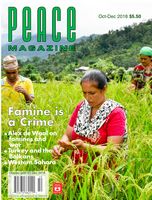
Peace Magazine Oct-Dec 2018, page 21. Some rights reserved.
Search for other articles by René Wadlow here
Now is the time to prevent Assam’s Muslims from suffering the fate of Burma’s Rohingya
The people of Assam, in northeast India, are sitting on a smoldering volcano that threatens to erupt into catastrophic suffering. The violence would target ethnic and religious minorities, particularly Bengali-speaking Muslims, on the pattern of the Rohingya of Burma.
The state of Assam has a population of some 30 million people according to the most recent Indian census (2011). Some 60 percent are considered Hindus, 34 percent Muslims, 4 percent Christians and 5 percent “other” (Jain, Buddhist, etc).
Most people also keep original animist beliefs, but there is no “animist” on the census choices. Northeast India has always been a mixture of ethnic and religious groups. During the colonial period, the whole northeast was called Assam. In 1965, Assam was divided into seven separate states, usually taking the name of the majority ethnic group—Nagaland, Tripura, Mizoram, Manapur—but no state is homogeneous. One part kept its original colonial name: Assam.
The Bengali-speaking Muslims are mostly descendants of migrants who arrived after the civil war that led to the independence of Bangladesh from Pakistan in 1971.
In keeping with the Hindu cultural bias of the current central government of Prime Minister Modi and the Bharatiya Janata Party, Bengali-speaking Hindus have been given automatic citizenship rights under a 2016 law. However, Bengali-speaking Muslims are considered as “non-Indian citizens” subject to deportation. For the past ten years, Bengali-speaking Muslims have been rounded up and put into camps, with families often being separated.
In July 2018, the National Register of Citizens listed four million people it considers non-citizens of India. This has caused insecurity and potentially panic among those on the list, some of whom are leaving Assam.
However, densely-populated Bangladesh cannot cope with the one million Rohingya refugees who have fled or been pushed out of Burma. The Bangladesh government wants no new arrivals, and certainly holds out no citizenship road either for the Rohingya or for arrivals from Assam.
It is not clear what the state government of Assam or of the central Indian government intend. All the states of northeast India have been political headaches since independence. New Delhi has offered government development funds but has not dealt creatively with this multi-ethnic, multi-cultural society. There are two possible reasons for the current oppressive policy. One reason may be a government effort to eliminate from the voting roll voters who might not vote for a narrow Hindu party. The other motive may be that the Assam government, seeing that the “international community” has not acted strongly to protect the Rohingya, is willing to push the Muslims out and give their land to non-Muslims.
Before there is greater violence and a refugee flow from Assam, there needs to be preventive diplomacy from the United Nations and non-governmental organizations.
The term “preventive diplomacy”—acting at the first sign of conflict before violence sets in—was used in U.N. Secretary-General Boutros Boutros Ghali’s 1992 report Agenda for Peace. An earlier secretary-general, U Thant, summed up preventive diplomacy as “one which is not heard of until it is successfully concluded or even never heard of at all.” Preventive diplomacy is normally non-coercive, low key and confidential in its approach. It works only if there is trust in the wisdom and impartiality of those taking the first steps. This presupposes a strong international civil service whose integrity is beyond question. An effective early warning system is essential. At the first signs of conflict such as persistent violations of human rights, refugee flows or the internal displacement of populations, a crisis team should be set up to monitor events. There should follow increased analysis of the situation and fact-finding, along with international pressure for negotiations. But repressive leaders will try to see how much they can get away with, so they must be warned that the process cannot remain confidential unless they cooperate.
Preventive diplomacy is not restricted to United Nations or national government officials. Non-governmental organizations, academic institutions and the media can all play a role. Reconciliation must be the aim, compassion the spirit, non-violence the means. We must all help build trans-national networks for reconciliation. Assam is a current test case.
René Wadlow is president of the Association of World Citizens.

Peace Magazine Oct-Dec 2018, page 21. Some rights reserved.
Search for other articles by René Wadlow here